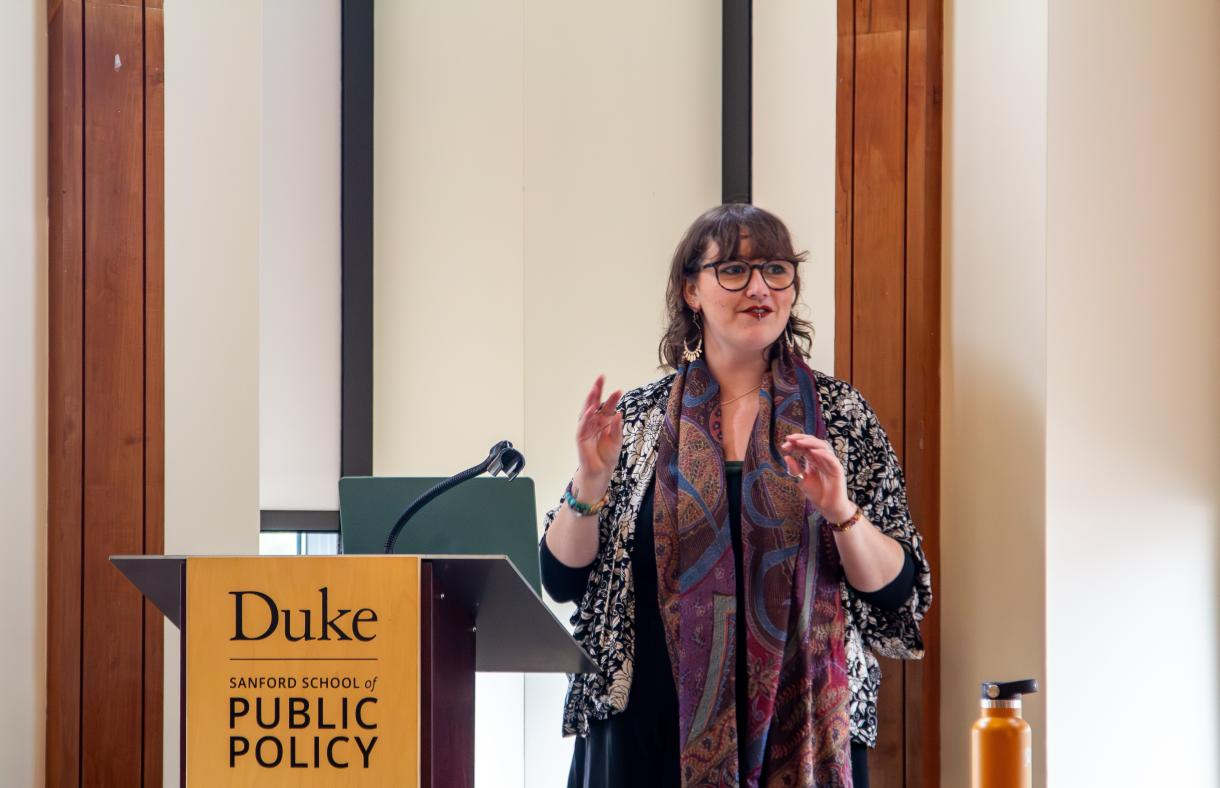
Climate Mobility and Climate Justice: The state of research and policy advocacy
Lauren Grant, founding executive director of Beyond Climate Collaborative, spoke to students and faculty about research, policy developments and challenges in addressing climate-related migration and displacement.
“It's not just climate change that actually pushes people to move…it's the interaction between climate and environmental change with social, economic, cultural, political, even legal factors,” said Lauren Grant, founding executive director of Beyond Climate Collaborative, in a presentation sponsored by the Duke Center for International Development.
During her talk, titled “Climate Mobility and Climate Justice: The state of research and policy advocacy,” Grant spoke to students and faculty about the complexities of climate-related migration. Calling climate-related migration a “cross-cutting issue,” she emphasized a need for a multidisciplinary research approach to address the interplay of climate change with other factors driving mobility.

While there has been a significant increase in published articles and case studies on climate-related migration and displacement in recent years, Grant acknowledged an unevenness in knowledge production, noting that most of the research has been published by authors from the Global North, focusing on the Pacific, Vietnam, Bangladesh, India and Mexico, with fewer studies on Africa, Central Asia and South America.
She also brought attention to an existing mobility bias, explaining that most published research has centered on the phenomena of movement.
A lot of the research...has really focused on mobility – people moving – and a lot less on those who don't move. But the reality is more people don't move than do move.
“A lot of the research that's been done on this topic has really focused on mobility – people moving – and a lot less on those who don't move,” she said. “But the reality is more people don't move than do move. This is often a combination of aspirations and the capability of the mover to stay. You also have people who might want to move, but are unable to move, which manifests as a kind of involuntary immobility. And then you have people who don't want to move and can't move.”
To better support laws and policies in addressing climate-related mobility challenges, Grant said stronger data collection is needed.
“We need disaggregated data on affected populations,” she explained. “We know that not everyone is impacted the same way, but we know very little about how that manifests and trends. We need that disaggregated data to show why we need financing and why we need better policy frameworks.”
Justice-based and rights-respecting research agendas are also needed, Grant stressed. This includes investigating legal and social justice challenges faced by displaced populations to ensure policies prioritize human rights and community participation, as well as encouraging research led by Indigenous, local and Global South scholars so that there is a plurality of knowledge systems to inform policy and practice.
It also includes reflecting on the power dynamics embedded in institutional mobility frameworks. How are policies are shaped by power structures? Whose interests are the policies serving?
In closing, Grant said the "overarching goal is always to be pushing for people-centered, human rights-respecting, justice-based approaches."
A human rights activist, Lauren Grant is the founding executive director of the Beyond Climate Collaborative, a global network to advance knowledge, ideas and resources to support emerging leaders advance environmental mobility justice, and the founding director of the International School on Climate Mobilities. She previously served as climate mobility advisor at the Africa Centre for Sustainable and Inclusive Development and director of field research at Earth Refuge, the first legal think tank dedicated to climate migrants. She holds an MSc. in Violence, Conflict and Development from SOAS University of London and an MA in Human Rights from Central European University.